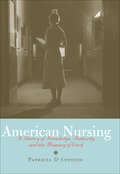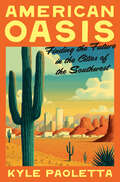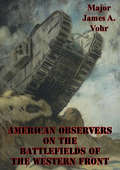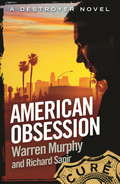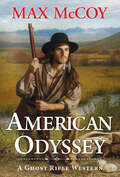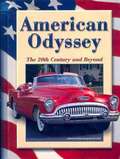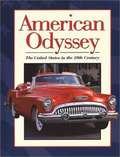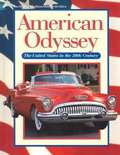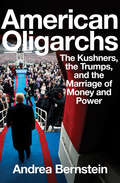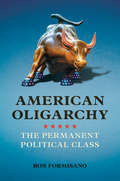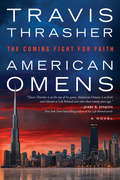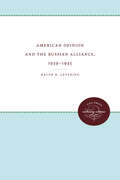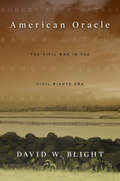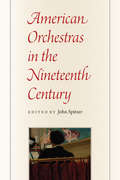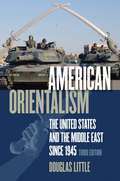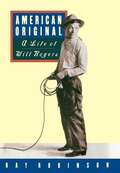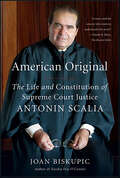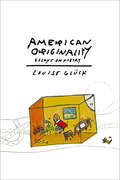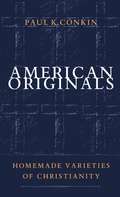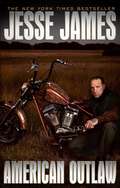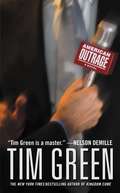- Table View
- List View
American Nursing: A History of Knowledge, Authority, and the Meaning of Work
by Patricia D'AntonioFirst Place, History and Public Policy, 2010 American Journal of Nursing Book of the Year AwardsThis new interpretation of the history of nursing in the United States captures the many ways women reframed the most traditional of all gender expectations—that of caring for the sick—to create new possibilities for themselves, to renegotiate the terms of some of their life experiences, and to reshape their own sense of worth and power. For much of modern U.S. history, nursing was informal, often uncompensated, and almost wholly the province of female family and community members. This began to change at the end of the nineteenth century when the prospect of formal training opened for women doors that had been previously closed. Nurses became respected professionals, and becoming a formally trained nurse granted women a range of new social choices and opportunities that eventually translated into economic mobility and stability. Patricia D'Antonio looks closely at this history—using a new analytic framework and a rich trove of archival sources—and finds complex, multiple meanings in the individual choices of women who elected a nursing career. New relationships and social and professional options empowered nurses in constructing consequential lives, supporting their families, and participating both in their communities and in the health care system. Narrating the experiences of nurses, D'Antonio captures the possibilities, power, and problems inherent in the different ways women defined their work and lived their lives. Scholars in the history of medicine, nursing, and public policy, those interested in the intersections of identity, work, gender, education, and race, and nurses will find this a provocative book.
American Oasis: Finding the Future in the Cities of the Southwest
by Kyle PaolettaAn expansive and revelatory historical exploration of the multicultural, water-seeking, land-destroying settlers of the most arid corner of North America, arguing that in order to know where the United States is going in the era of mass migration and climate crisis we must understand where the Southwest has already beenAlbuquerque. Phoenix. Tucson. El Paso. Las Vegas. Iconic American cities surrounded by desert and rust. Teeming metropolises that seem to exist independently of the seemingly inhospitable and arid landscape that surrounds them, belying the rich insight they offer into American stories of migration, industry, bloodshed, and rebirth. Charting a geographic path through America's largest and hottest deserts, acclaimed journalist Kyle Paoletta maps the past and future of these cities, and the many other settlements from rural town to urban sprawl that make up the region that has come to be called &“the American Southwest.&” Weaving together the stories of immigrants and indigenous populations, American Oasis pulls back the layers of settlement, sediment, habit, and effect that successive empires have left on the region, from the Athapascan, Diné, Tewa, Apache, and Comanche, to the Spanish, Mexican, and, finally, American. As Paoletta&’s journey into the Southwest&’s history becomes inextricably linked to an exploration of its dependency on water, he begins to ask: where, ultimately, will cities like Las Vegas and Phoenix find themselves once the Colorado River and its branches dry up? Richly reported and sweeping in its history, American Oasis is the story of what one iconic region&’s past can tell us about our shared environmental and cultural future.
American Observers On The Battlefields Of The Western Front
by Major James A. Vohr USMCAlthough during World War I the United States employed observers on the battlefields of the Western Front, the information they provided lacked the substance and conclusions required to evolve the tactical doctrine of the American Expeditionary Forces (AEF). In initial engagements, the AEF was largely forced to rely, with predictable negative outcome, upon outdated concepts founded largely upon the prejudices of the Army's leadership.In August of 1914 the United States Army and Marine Corps demonstrated strong foresight, considering the isolationist perspective of the nation, in detailing officers to the battlefields of Europe. These officers were given little guidance, but their mission was clearly to report on military actions and developments in what was becoming the largest struggle in history. A significant military development of World War I noted by the U.S. was the advance of offensive infantry tactics to cope effectively with the characteristics and lethality of the modern battlefield.The United States, with a two and one-half year opportunity to observe tactics prior to the engagement of the AEF, arguably should have benefited from the experience of others. However, this was not the case. The AEF in its initial engagements, performed much as its European counterparts did at the onset of the war. Eventually the AEF performance improved, but only as U.S. soldiers and Marines gained personal battlefield experience.
American Obsession: Number 109 in Series (The Destroyer #109)
by Warren Murphy Richard SapirThe new body culture is finally bringing its rewards, thanks to a hormone treatment that rapidly restructures body fat to muscle, all overnight, during a true beauty snooze.But it's way-out expensive, and only the rich and famous can indulge. After all, what's a thousand bucks a day when the result is a body to die for?There are some side effects - no pain, no gain! But when innocent people start paying a steep price for the stars' self-improvement regimens, CURE's Dr. Smith sends Remo and Chiun to infiltrate the Lycra crowd and the hallowed halls of the legalized drug trade. Soon their investigation is blocked by a greedy corporation, but the worst challenge is from an army of celebrities - lean, mean products of a killer diet....Breathlessly action-packed and boasting a winning combination of thrills, humour and mysticism, the Destroyer is one of the bestselling series of all time.
American Odyssey (A Ghost Rifle Western #2)
by Max McCoyMax McCoy, the Spur Award-winning author of Damnation Road, continues his American Western saga of the Ghost Rifle as the violence and bloodshed the weapon caused return to haunt the man who created it . . .THE WEAPON AND THE WILDERNESS Ten years have passed since Jack Picaro lost his Ghost Rifle—the firearm he invented, the one that never missed its target. The loss of the rifle calmed the hellraiser in his soul. Instead of returning to the gambling halls and whiskey bars of St. Louis, Jack has spent the last decade as a fur trapper in Wyoming&’s Wild River Range, married to Sky, the daughter of an Arikara war chief. Then, after helping rescue U.S. soldiers captured by Crow Indians in the Rocky Mountains, Jack hears the familiar bell-like report of his Ghost Rifle. Determined to retrieve his deadly property, he travels deep into Lakota territory, facing down old enemies—and resuming old sinful habits—unaware of what awaits him when he eventually returns home to his family.&“Few Western writers today can spin a tale with style, wit, and rawness better than Max McCoy.&”—Johnny D. Boggs, Western Heritage and Spur Award-winning author of West Texas Kill
American Odyssey: The 20th Century and Beyond
by Gary B. NashThe book covers relationships, interprets evidence, and connects the present to the past--that's what history is all about.
American Odyssey: The United States In The 20th Century
by Gary B. NashThe Americas had long been the home to a rich variety of Native American cultures. Hundreds of years ago, however, other peoples-- Europeans and enslaved Africans--set foot in what was to them a new world. Together they created the United States of America--a nation founded on the promise of liberty and equality for all the diverse people who have contributed to its success.
American Odyssey: The United States in the 20th Century
by Gary B. NashA history of the United States in the twentieth century, featuring sociological and cultural events, as well as strictly historical, and using many pertinent literary excerpts.
American Odyssey: The United States in the 20th Century
by Gary B. NashA history of the United States in the twentieth century, featuring sociological and cultural events, as well as strictly historical, and using many pertinent literary excerpts.
American Odyssey: The United States in the Twentieth Century
by Gary B. NashA history of the United States in the twentieth century, featuring sociological and cultural events, as well as strictly historical, and using many pertinent literary excerpts.
American Oligarchs: The Kushners, The Trumps, And The Marriage Of Money And Power
by Andrea BernsteinA multigenerational saga of two families, who rose from immigrant roots to the pinnacle of wealth and power, that tracks the unraveling of American democracy. <P><P>In American Oligarchs, award-winning investigative journalist Andrea Bernstein tells the story of the Trump and Kushner families like never before. Their journey to the White House is a story of survival and loss, crime and betrayal, that stretches from the Klondike Gold Rush, through Nazi-occupied Poland and across the American Century, to our new gilded age. In building and maintaining their dynastic wealth, these families came to embody the rising nationalism and inequality that has pushed the United States to the brink of oligarchy. <P><P>Building on her landmark reporting for the acclaimed podcast Trump, Inc. and The New Yorker, Bernstein’s painstaking detective work brings to light new information about the families’ arrival as immigrants to America, their paths to success, and the business and personal lives of the president and his closest family members. <P><P>Bernstein traces how the two families ruthlessly harnessed New York and New Jersey machine politics to gain valuable tax breaks and grew rich on federal programs that bolstered the middle class. She shows how the Trump Organization, denied credit by American banks, turned to shady international capital. She reveals astonishing new details about Charles Kushner’s attempts to ensnare his brother-in-law with a prostitute and explores how Jared Kushner and his father used a venerable New York newspaper to bolster their business empire. <P><P>Drawing on more than two hundred interviews and more than one hundred thousand pages of documents, many previously unseen or long forgotten, Bernstein shows how the Trumps and the Kushners repeatedly broke rules and then leveraged secrecy, intimidation, and prosecutorial and judicial power to avoid legal consequences. <P><P>The result is a compelling narrative that details how the Trump and Kushner dynasties encouraged and profited from a system of corruption, dark money, and influence trading, and that reveals the historical turning points and decisions—on taxation, regulation, white-collar crime, and campaign finance laws—that have brought us to where we are today. <P><P><b>A New York Times Bestseller</b>
American Oligarchy: The Permanent Political Class
by Ron FormisanoA permanent political class has emerged on a scale unprecedented in our nation 's history. Its self-dealing, nepotism, and corruption contribute to rising inequality. Its reach extends from the governing elite throughout nongovernmental institutions. Aside from constituting an oligarchy of prestige and power, it enables the creation of an aristocracy of massive inherited wealth that is accumulating immense political power. In a muckraking tour de force reminiscent of Lincoln Steffens, Upton Sinclair, and C. Wright Mills, American Oligarchy demonstrates the way the corrupt culture of the permanent political class extends down to the state and local level. Ron Formisano breaks down the ways this class creates economic inequality and how its own endemic corruption infects our entire society. Formisano delves into the work of not just politicians but lobbyists, consultants, appointed bureaucrats, pollsters, celebrity journalists, behind-the-scenes billionaires, and others. Their shameless pursuit of wealth and self-aggrandizement, often at taxpayer expense, rewards channeling the flow of income and wealth to elites. That inequality in turn has choked off social mobility and made a joke of meritocracy. As Formisano shows, these forces respond to the oligarchy 's power and compete to bask in the presence of the .01 percent. They also exacerbate the dangerous instability of an American democracy divided between extreme wealth and extreme poverty.
American Omens: The Coming Fight for Faith: A Novel
by Travis ThrasherIn this taut thriller that depicts a future where belief is dangerous, faith is deemed hatred, and a group of powerful elite keeps watch, the Reckoner has come to wake up America.The year is 2038 and Cheyenne Burne is a brilliant young programmer working for Acatour, the world's top technology firm. Her father converts to Christianity, and he suddenly disappears without a trace. When a stranger hands Cheyenne a coded message that sends her on a collision course with a clandestine group of believers, she must put her life in the hands of those following a man known only as the Reckoner. He claims he wants to bring back true faith in Christ to America and also reveal the forces behind the disappearances of the many renowned people who publicly declared their Christian faith. Operating in the shadows and living off the grid, this mysterious prophet assembles a ragtag team--including a former bookseller whose store was shut down for selling prohibited books--to help him take the battle for transparency to the top. With a ruthless FBI agent closing in, can Cheyenne and the others expose the truth and lead a return to God in America before it's too late?
American Opinion and the Russian Alliance, 1939-1945
by Ralph B. LeveringIn this analysis of the years of greatest American friendship with the Soviet Union, Levering comes to two conclusions. First, cosmopolitan, educated Americans of all classes were much more likely to change their negative attitudes of 1939 to positive ones by 1943 than were the provincial and poorly educated. Second, governmental leaders and the media, whether conservative or liberal, did not prepare the public for the probable realities of postwar international politics.Originally published in 1976.A UNC Press Enduring Edition -- UNC Press Enduring Editions use the latest in digital technology to make available again books from our distinguished backlist that were previously out of print. These editions are published unaltered from the original, and are presented in affordable paperback formats, bringing readers both historical and cultural value.
American Oracle: The Civil War in the Civil Rights Era
by David W. Blight“The ghosts of the Civil War never leave us, as David Blight knows perhaps better than anyone, and in this superb book he masterfully unites two distant but inextricably bound events.”―Ken Burns Standing on the steps of the Lincoln Memorial on August 28, 1963, a century after the signing of the Emancipation Proclamation, Martin Luther King, Jr., declared, “One hundred years later, the Negro still is not free.” He delivered this speech just three years after the Virginia Civil War Commission published a guide proclaiming that “the Centennial is no time for finding fault or placing blame or fighting the issues all over again.” David Blight takes his readers back to the centennial celebration to determine how Americans then made sense of the suffering, loss, and liberation that had wracked the United States a century earlier. Amid cold war politics and civil rights protest, four of America’s most incisive writers explored the gulf between remembrance and reality. Robert Penn Warren, the southern-reared poet-novelist who recanted his support of segregation; Bruce Catton, the journalist and U.S. Navy officer who became a popular Civil War historian; Edmund Wilson, the century’s preeminent literary critic; and James Baldwin, the searing African-American essayist and activist—each exposed America’s triumphalist memory of the war. And each, in his own way, demanded a reckoning with the tragic consequences it spawned. Blight illuminates not only mid-twentieth-century America’s sense of itself but also the dynamic, ever-changing nature of Civil War memory. On the eve of the 150th anniversary of the war, we have an invaluable perspective on how this conflict continues to shape the country’s political debates, national identity, and sense of purpose.
American Orchestras in the Nineteenth Century
by John SpitzerStudies of concert life in nineteenth-century America have generally been limited to large orchestras and the programs we are familiar with today. But as this book reveals, audiences of that era enjoyed far more diverse musical experiences than this focus would suggest. To hear an orchestra, people were more likely to head to a beer garden, restaurant, or summer resort than to a concert hall. And what they heard weren't just symphonic works--programs also included opera excerpts and arrangements, instrumental showpieces, comic numbers, and medleys of patriotic tunes. This book brings together musicologists and historians to investigate the many orchestras and programs that developed in nineteenth-century America. In addition to reflecting on the music that orchestras played and the socioeconomic aspects of building and maintaining orchestras, the book considers a wide range of topics, including audiences, entrepreneurs, concert arrangements, tours, and musicians' unions. The authors also show that the period saw a massive influx of immigrant performers, the increasing ability of orchestras to travel across the nation, and the rising influence of women as listeners, patrons, and players. Painting a rich and detailed picture of nineteenth-century concert life, this collection will greatly broaden our understanding of America's musical history.
American Orchestras in the Nineteenth Century
by John SpitzerStudies of concert life in nineteenth-century America have generally been limited to large orchestras and the programs we are familiar with today. But as this book reveals, audiences of that era enjoyed far more diverse musical experiences than this focus would suggest. To hear an orchestra, people were more likely to head to a beer garden, restaurant, or summer resort than to a concert hall. And what they heard weren’t just symphonic works—programs also included opera excerpts and arrangements, instrumental showpieces, comic numbers, and medleys of patriotic tunes.This book brings together musicologists and historians to investigate the many orchestras and programs that developed in nineteenth-century America. In addition to reflecting on the music that orchestras played and the socioeconomic aspects of building and maintaining orchestras, the book considers a wide range of topics, including audiences, entrepreneurs, concert arrangements, tours, and musicians’ unions. The authors also show that the period saw a massive influx of immigrant performers, the increasing ability of orchestras to travel across the nation, and the rising influence of women as listeners, patrons, and players. Painting a rich and detailed picture of nineteenth-century concert life, this collection will greatly broaden our understanding of America’s musical history.
American Orientalism
by Douglas LittleDouglas Little explores the stormy American relationship with the Middle East from World War II through the war in Iraq, focusing particularly on the complex and often inconsistent attitudes and interests that helped put the United States on a collision course with radical Islam early in the new millennium. After documenting the persistence of "orientalist" stereotypes in American popular culture, Little examines oil, Israel, and other aspects of U.S. policy. He concludes that a peculiar blend of arrogance and ignorance has led American officials to overestimate their ability to shape events in the Middle East from 1945 through the present day, and that it has been a driving force behind the Iraq war. For this updated third edition, Little covers events through 2007, including a new chapter on the Bush Doctrine, demonstrating that in many important ways, George W. Bush's Middle Eastern policies mark a sharp break with the past.
American Original: A Life Of Will Rogers
by Ray RobinsonA biography of Will Rogers, an early twentieth century humorist, newspaper columnist, actor in silent movies and then talkies and a spectacular lariat performer, who was very proud of his one-quarter Cherokee ancestry. Definitely an American original because of the combination of his folksy language and wry humor.
American Original: The Life and Constitution of Supreme Court Justice Antonin Scalia
by Joan BiskupicThe first full-scale biography of the Supreme Court's most provocative—and influential—justiceIf the U.S. Supreme Court teaches us anything, it is that almost everything is open to interpretation. Almost. But what's inarguable is that, while the Court has witnessed a succession of larger-than-life jurists in its two-hundred-year-plus history, it has never seen the likes of Supreme Court Justice Antonin Scalia. Combative yet captivating, infuriating yet charming, the outspoken jurist remains a source of curiosity to observers across the political spectrum and on both sides of the ideological divide. And after nearly a quarter century on the bench, Scalia may be at the apex of his power. Agree with him or not, Scalia is "the justice who has had the most important impact over the years on how we think and talk about the law," as the Harvard law dean Elena Kagan, now U.S. Solicitor General, once put it. Scalia electrifies audiences: to hear him speak is to remember him; to read his writing is to find his phrases permanently affixed in one's mind. But for all his public grandstanding, Scalia has managed to elude biographers—until now. In American Original: The Life and Constitution of Supreme Court Justice Antonin Scalia, the veteran Washington journalist Joan Biskupic presents for the first time a detailed portrait of this complicated figure and provides a comprehensive narrative that will engage Scalia's adherents and critics alike. Drawing on her long tenure covering the Court, and on unprecedented access to the justice, Biskupic delves into the circumstances of his rise and the formation of his rigorous approach to the bench. Beginning with the influence of Scalia's childhood in a first-generation Italian American home, American Original takes us through his formative years, his role in the Nixon-Ford administrations, and his trajectory through the Reagan revolution. Biskupic's careful reporting culminates with the tumult of the contemporary Supreme Court—where it was and where it's going, with Scalia helping to lead the charge.Even as Democrats control the current executive and legislative branches, the judicial branch remains rooted in conservatism. President Obama will likely appoint several new justices to the Court—but it could be years before those appointees change the tenor of the law. With his keen mind, authoritarian bent, and contentious rhetorical style, Scalia is a distinct and persuasive presence, and his tenure is far from over. This new book shows us the man in power: his world, his journey, and the far-reaching consequences of the transformed legal landscape.
American Originality: Essays on Poetry
by Louise GlückA luminous collection of essays from one of our most original and influential poets Five decades after her debut poetry collection, Firstborn, Louise Glück is a towering figure in American letters. Written with the same probing, analytic control that has long distinguished her poetry, American Originality is Glück’s second book of essays—her first, Proofs and Theories, won the 1993 PEN/Martha Albrand Award for First Nonfiction. Glück’s moving and disabusing lyricism is on full display in this decisive new collection. From its opening pages, American Originality forces readers to consider contemporary poetry and its demigods in radical, unconsoling, and ultimately very productive ways. Determined to wrest ample, often contradictory meaning from our current literary discourse, Glück comprehends and destabilizes notions of “narcissism” and “genius” that are unique to the American literary climate. This includes erudite analyses of the poets who have interested her throughout her own career, such as Rilke, Pinsky, Chiasson, and Dobyns, and introductions to the first books of poets like Dana Levin, Peter Streckfus, Spencer Reece, and Richard Siken. Forceful, revealing, challenging, and instructive, American Originality is a seminal critical achievement.
American Originals
by Paul K. ConkinIn a work of striking breadth and clarity, Paul Conkin offers an even-handed and in-depth look at the major American-made forms of Christianity--a diverse group of religious traditions, each of which reflects a significant break from western Christian orthodoxy. Identifying six distinctive types, Conkin examines the major denominations representative of each original variety of American Christianity: restoration (Churches of Christ, Disciples of Christ); humanistic (Unitarians, Universalists); apocalyptic (Adventists, Jehovah's Witnesses); Mormon (Church of Jesus Christ of Latter-day Saints); spiritual (Christian Science, Unity); and ecstatic (Holiness and Pentecostal denominations). Focusing on the early years and maturation of these groups, he discusses their founders and leaders, origins and Old World roots, and essential doctrines and practices. Conkin closes each chapter with a guide to further reading. The first comprehensive survey of these American originals, this book will serve as a valuable resource on a number of religious traditions whose members not only comprise a significant percentage of the American population but also make up an increasing proportion of Christian converts worldwide.
American Outlaw
by Jesse JamesThe New York Times bestselling self-portrait of a flawed but determined everyman: rebel, outlaw, gearhead, artist, entrepreneur, lost son, and fiercely committed father Jesse James is everything you imagined him to be-- and more than you ever expected. He has led a violent life. He's survived lower depths, faced harder times, and beaten down more private demons than most--and lived to tell his story with honesty, introspection, and humility. He's tough as nails and riding hard through life, with plenty of wisdom to share about taking a hit and coming back up. In American Outlaw, Jesse reveals all: from his volatile upbringing and troubled relationship with his father to his wild days of car thieving and juvenile detention; from knocking heads as a rock 'n' roll bodyguard to his destructive drinking and barroom brawling; from building an empire from the ground up to marriages marked with both happiness and gut-wrenching pain; from living inside the hottest level of paparazzi hell to rehab and making peace with his past.
American Outrage
by Tim GreenJake Carlson, a correspondent for the TV news show AMERICAN OUTRAGE, inhabits a world of sensational trials and crazed celebrities. One of the nation's top journalists, he's used to dragging himself into the dirt to get the truth. When his adopted son Sam asks him to use his muckraking talents to find his birth mother, Jake is stunned by the ugly secrets he uncovers: an international crime syndicate, a horrifying child trafficking ring, and a corrupt politician, the patriarch of an old New York financial dynasty. Initially galvanized by a career-making story, Jake---and his son---are soon the victims of brutal violence and the targets of Jake's fellow reporters, who dog them for their story. Concerned for the survival of his family, Jake realizes some sins of the past should never be uncovered...
American Outsourcing
by Richard H.K. Vietor Alexander VeytsmanCovers the phenomenon of outsourcing jobs from the United States. Reviews the evolution of Mexico's Maquiladoras, manufacturing special economic areas in China, and information technology and service-sourcing in India. Also reviews exports/imports, exchange rates, wages, and jobs. Considers major outsourcer General Electric's moves to these countries and its plans. Compares Mexico and China, and India and China, asking what the United States and GE should be doing.
